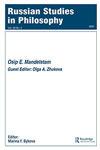A “Big Culture” and Cogito
IF 0.1
4区 哲学
Q4 Arts and Humanities
引用次数: 0
Abstract
ABSTRACT The Cartesian cogito ergo sum is a major milestone for modern European philosophy, which shaped its mainstream for centuries. This dictum states that consciousness is the only reliable object of inquiry, with a criterion of radical doubt, the goal of which is to cut off any unreliable statement leaving only that which is trustworthy and which serves as a starting point to construct true knowledge. Cogito ergo sum is not a syllogism with a missing major premise, for such a premise would not pass this radical doubt criterion. Then, what does justify ergo? To justify it, cogito should be the same as sum, though taken differently. Only in that case ergo adds nothing to undoubted cogito, and cogito ergo sum passes the radical doubt criterion. Nothing to object so far; but why a full stop after sum? Cogito is any activity of my mind. To display activity, I have to be. This is beyond doubt; yet equally I have to be able to act. The universe of total being (total sum) of Parmenides leaves no place for cogito as activity. Therefore cogito ergo sum is possible only on condition of adding et ergo ago, otherwise it is self-contradictory. A cluster of kindred cultures share this or that reading of the cogito formula. This cluster is called ‘Big Culture.’ European culture reads it as cogito ergo sum, while Arabo-Muslim culture reads it as cogito ergo ago.“大文化”与我思
笛卡尔cogito-ergo-sum是现代欧洲哲学的一个重要里程碑,它塑造了欧洲哲学数百年的主流。这句格言指出,意识是唯一可靠的探究对象,其标准是彻底怀疑,其目的是切断任何不可靠的陈述,只留下值得信赖的陈述,并作为构建真正知识的起点。Cogito-ergo-sum不是一个缺少大前提的三段论,因为这样的前提不会通过这个激进的怀疑标准。那么,什么是ergo的正当性呢?为了证明这一点,cogito应该与sum相同,尽管取法不同。只有在这种情况下,ergo才不会对毋庸置疑的cogito添加任何内容,并且cogito-ergo-sum通过了激进的怀疑准则。到目前为止没有什么可反对的;但为什么要在sum之后加一个句号呢?Cogito是我头脑中的任何活动。要想展现活力,我必须做到。这是毋庸置疑的;但同样,我也必须能够行动起来。Parmenides的整体存在(总和)的宇宙没有留下作为活动的cogito的位置。所以cogito-ergo-sum只有在加上et ergo-ago的条件下才是可能的,否则它是自相矛盾的。一群相似的文化分享着对cogito公式的这种或那种解读。这个集群被称为“大文化”欧洲文化将其解读为cogito-ergo-sum,而阿拉伯穆斯林文化将其理解为cogito ergo-ago。
本文章由计算机程序翻译,如有差异,请以英文原文为准。
求助全文
约1分钟内获得全文
求助全文
来源期刊

RUSSIAN STUDIES IN PHILOSOPHY
PHILOSOPHY-
CiteScore
0.10
自引率
0.00%
发文量
14
期刊介绍:
Russian Studies in Philosophy publishes thematic issues featuring selected scholarly papers from conferences and joint research projects as well as from the leading Russian-language journals in philosophy. Thematic coverage ranges over significant theoretical topics as well as topics in the history of philosophy, both European and Russian, including issues focused on institutions, schools, and figures such as Bakhtin, Fedorov, Leontev, Losev, Rozanov, Solovev, and Zinovev.
 求助内容:
求助内容: 应助结果提醒方式:
应助结果提醒方式:


